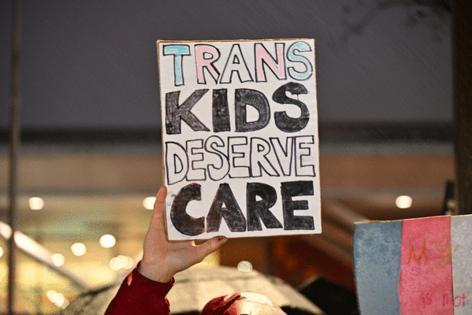As Supreme Court rules on trans youth, California aims to expand 'sanctuary' protections
Published in News & Features
SACRAMENTO, Calif. — Democratic state lawmakers and LGBTQ advocates slammed a Wednesday decision by the U.S. Supreme Court that upholds a Tennessee ban on gender-affirming health care for transgender youth, calling the ruling “horrifying” and “bigoted.”
In a 6-3 decision, the court sided with the state of Tennessee over a 2023 law prohibiting doctors from prescribing treatments such as hormone therapy, medications to delay puberty or surgery to patients under 18, even with parental consent.
Doctors and families in the state challenged the law and claimed it violated the Constitution’s equal protection clause.
“It does not,” Chief Justice John Roberts wrote in the majority opinion. “Questions regarding the law’s policy are thus appropriately left to the people, their elected representatives, and the democratic process.”
The ruling protects similar bans on gender affirming care for minors in Tennessee and 26 other states. Nearly 40% of transgender youth live in the states with bans, according to the Human Rights Campaign.
“Health care decisions should be made between doctors, parents and children,” said Tony Hoang, executive director of Equality California. “This ruling permits the government to intrude into deeply personal medical decisions. It is a shameful and dangerous setback for transgender youth, their families, and every person who believes in freedom and bodily autonomy.”
Conservative groups, including the Christian-based California Family Council, support laws to block hormone treatment and surgeries before a child turns 18. They often cite stories from “detransitioners” — people who underwent and later regretted medical care to align with a different gender identity — as reason to prohibit care for trans youth.
“Children’s gender confusion is often temporary and can be resolved through proper care and support, not through permanent medical alterations that create lifelong patients,” said Jonathan Keller, president of the California Family Council. “These brave individuals remind us that change is possible and that we must protect children’s futures, not foreclose them through ideology-driven medicine.”
There is little research into people who detransition and their reasons for doing so, but one study suggested fewer than 1% of people regret gender-affirming surgery.
State Sen. Scott Wiener, D-San Francisco, said the Supreme Court ruling “will hurt so many young people who are just trying to live their best lives and be who they are. The Court is giving bigots like Trump a permission slip to make it impossible to be trans.”
California bills protecting trans kids
As Tennessee and Republican-led state legislatures passed laws to restrict care for transgender minors, California lawmakers and Gov. Gavin Newsom approved a slew of bills to expand gender affirming care and privacy protections for people who receive it, particularly children and youth.
Wiener wrote a 2022 “transgender state of refuge” law to prepare for scenarios that could follow Wednesday’s court ruling. It bans medical providers in California from sharing information related to a transgender child’s care, including for subpoenas from other states. It’s meant to protect parents of trans minors and physicians from prosecution in states with laws that criminalize gender-affirming care for trans youth.
However, an analysis for the bill noted the likely conflict with laws in other states is uncertain and “it is unclear whether this bill will run afoul of the Constitution.”
Another law Newsom signed in 2023 requires courts to seal petitions for a change of gender or sex identifier filed by a minor. Attorney General Rob Bonta said his office is “committed to safeguarding and upholding the healthcare rights and freedoms for all individuals, including our transgender youth.”
Newsom’s office did not comment on the ruling and directed questions to Bonta’s office. The governor came under fire from LGBTQ advocates and fellow Democrats after he said it is “deeply unfair” to allow trans girls to participate in girls’ sports earlier this year.
This year, Wiener is trying to build on California’s existing privacy protections. He cited a transgender woman’s legal fight to keep her name and sex change records confidential and a recent study that found law enforcement can access databases that track testosterone prescriptions, including sensitive patient information, without a warrant as gaps in the law.
Two of his bills to address those issues passed an Assembly committee Tuesday on party-line votes.
Wiener said the bills’ forward momentum “sends a powerful signal that transgender people have a safe home in California, even as the Trump Administration wages all-out assault on their very existence.”
_____
©2025 The Sacramento Bee. Visit sacbee.com. Distributed by Tribune Content Agency, LLC.







Comments